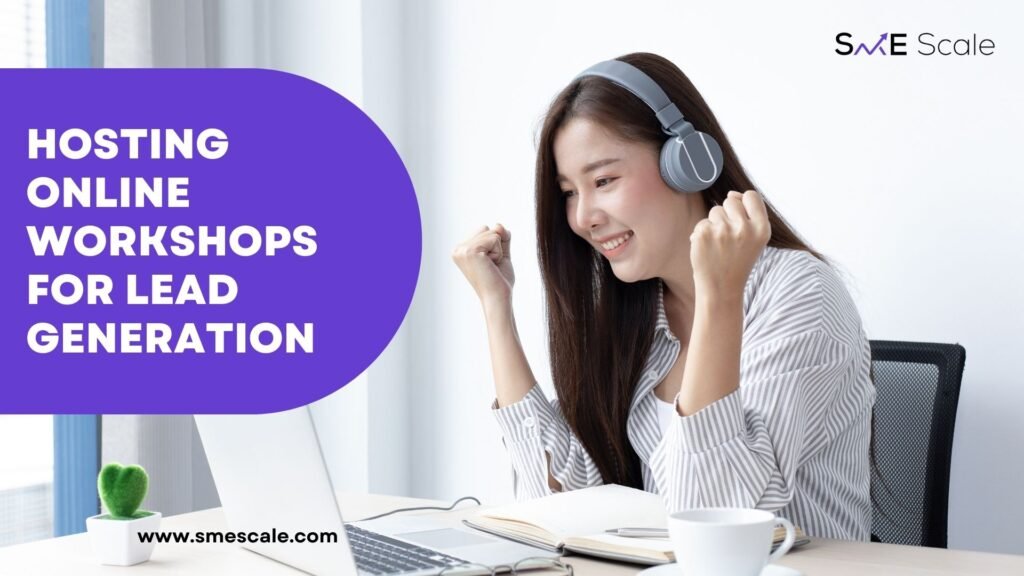
In today’s competitive digital landscape, small and medium-sized enterprises (SMEs) must find innovative ways to generate leads. Online workshops have emerged as a powerful strategy to build relationships with potential customers, establish authority, and ultimately drive lead generation. For SMEs, these workshops present an opportunity to share valuable insights, showcase expertise, and connect directly with audiences in a way that traditional lead generation methods may not offer. In this blog, we explore the benefits of hosting online workshops, a real-life case study from SME Scale that demonstrates their impact, and the psychological principles that make workshops so effective.
Why Online Workshops Work for Lead Generation
Online workshops are structured, interactive sessions that provide audiences with valuable, actionable insights while positioning the host as an expert in their field. The benefits of workshops for lead generation are multifaceted:
Trust and Authority: By sharing knowledge and expertise, businesses build credibility, encouraging attendees to trust the brand.
Engagement: Workshops offer a direct connection with potential customers, encouraging questions and interaction that build rapport.
Qualified Leads: Since attendees voluntarily sign up, they are likely to have a genuine interest in the brand’s offerings, resulting in more qualified leads.
Low-Cost and Scalable: Compared to in-person events, online workshops are affordable and can reach a broader audience with minimal overhead.
Case Study: Boosting Leads with SME Scale’s Online Workshop Strategy
Background: SME Scale recently partnered with EcoHome Goods, a sustainable homeware company, to enhance lead generation through online workshops. EcoHome Goods, known for its eco-friendly products, wanted to connect with environmentally conscious consumers but struggled to engage new audiences through traditional marketing channels.
Workshop Design and Strategy: The SME Scale team developed a workshop series titled “Sustainable Living Made Simple,” aimed at educating consumers about eco-friendly practices they could easily integrate into daily life. SME Scale applied specific strategies to maximize the workshop’s effectiveness as a lead-generation tool:
Clear Value Proposition: Each workshop topic focused on practical tips and how-tos, such as “Creating a Plastic-Free Kitchen” and “Choosing Eco-Friendly Cleaning Products.” The content aligned perfectly with EcoHome Goods’ products, subtly introducing them as solutions to the challenges discussed in the workshops.
Exclusive Offers and Follow-Up: SME Scale created incentives for attendees, such as exclusive discounts on products featured during the workshop. Additionally, SME Scale used post-workshop emails to share resources and product recommendations, encouraging attendees to continue their sustainable journey with EcoHome Goods.
Interactive Elements and Engagement: SME Scale included Q&A sessions, polls, and live product demos to foster interaction. This engagement strengthened attendees’ connection with the brand, making them more likely to act on the post-workshop offers.
Results: Within two months, EcoHome Goods saw a 40% increase in lead generation. Workshop participants demonstrated a higher conversion rate than traditional leads, and many attendees signed up for the brand’s newsletter and made purchases, drawn by the educational, non-salesy approach. EcoHome Goods also experienced a notable boost in customer loyalty, with several attendees becoming repeat customers.
The Psychology Behind Effective Online Workshops
The success of online workshops lies in the psychology of learning and engagement. Here are three psychological principles that make workshops a powerful tool for lead generation:
Authority and Trust: When businesses educate rather than sell, they establish authority. According to the psychological principle of authority, people are more likely to trust and follow recommendations from perceived experts. For EcoHome Goods, the workshop’s practical advice on sustainable living created trust and portrayed the brand as an eco-friendly authority.
Reciprocity: Offering free value creates a sense of reciprocity, where attendees feel inclined to give something back—often in the form of loyalty or purchases. This principle was evident in EcoHome Goods’ workshops; after receiving valuable insights, attendees were more likely to support the brand through purchases or referrals.
Community Building and Social Proof: Online workshops foster a sense of community, which builds social proof and encourages engagement. When participants see others asking questions and engaging with the content, it reinforces their own participation and connection to the brand. During EcoHome Goods’ workshops, live polls and shared success stories demonstrated to attendees that they were part of a larger movement, further strengthening their relationship with the brand.
Practical Tips for Running a Successful Online Workshop
For SMEs looking to replicate the success of online workshops, here are actionable steps to consider:
Define Your Target Audience and Goals: Identify the specific audience you want to attract and design the workshop around their interests. For EcoHome Goods, this meant focusing on eco-conscious individuals interested in sustainable living.
Offer Actionable Insights and Interactive Elements: Provide valuable insights and tips that attendees can apply immediately. Incorporate polls, Q&As, or live chats to make the workshop interactive and engaging.
Create a Follow-Up Plan: Capture attendee emails during registration and send follow-up emails with additional resources, offers, or invitations to future events. This builds ongoing engagement and helps convert attendees into leads.
Promote Across Multiple Channels: Use social media, email newsletters, and your website to promote the workshop. Partnering with influencers or like-minded brands can expand your reach and attract a more targeted audience.
Use the Workshop to Educate, Not Sell: Focus on educating your audience rather than pushing sales. This builds trust and encourages genuine interest in your brand.
Conclusion: Leveraging Online Workshops for Long-Term Growth
Online workshops represent a dynamic, engaging approach to lead generation for SMEs. By focusing on delivering value, building authority, and fostering community, businesses can create lasting connections with potential customers. EcoHome Goods’ experience demonstrates that well-planned, educational workshops can significantly improve lead quality and conversion rates. For SMEs looking to scale, workshops not only drive short-term results but also nurture relationships that fuel long-term growth. With guidance from experts like SME Scale, businesses can unlock the full potential of online workshops, transforming them into powerful tools for sustainable growth.

